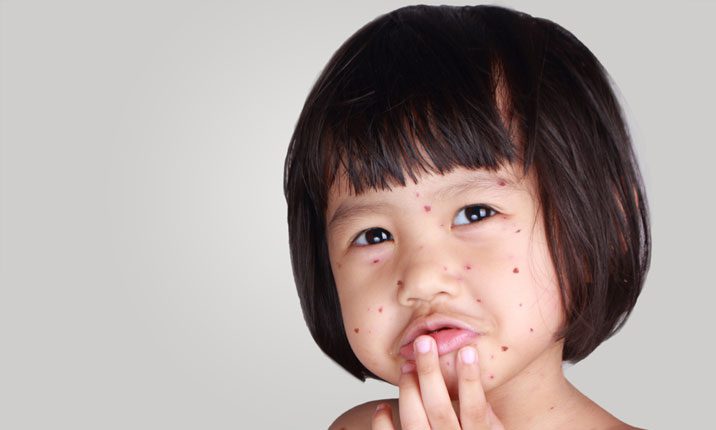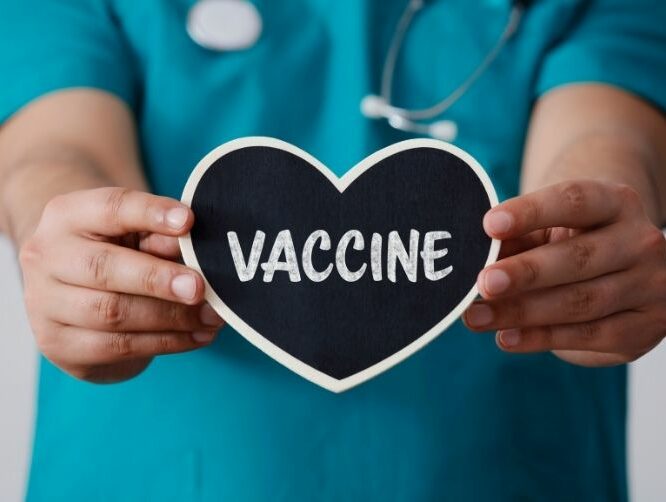Childhood vaccination programmes have successfully controlled the incidence of infectious diseases and significantly reduced infant and child mortality.
Once fatal, infectious diseases are now a rarity thanks to childhood vaccination programmes. However, many parents are concerned about the potential adverse effects of vaccines. Worryingly, vaccines have been falsely linked to a variety of conditions such as sudden infant death syndrome, developmental disorders such as autism, diabetes, asthma, allergies, multiple sclerosis and even cancer. Dr Mohana Rajakulendran, paediatrician and mother of 2, addresses common parental concerns regarding the safety of childhood vaccinations and other common vaccine myths.
Childhood Vaccine Myths
Myth 1:
Vaccinations are less effective when given during a cough or a cold.
Truth
A mild illness such as a cough, cold, diarrhoea or a low grade fever does not affect how well the body responds to a vaccine. Having a vaccine during a mild illness or during a course of antibiotics also does not affect the immune system’s ability to fight the illness. Instead, your child should get vaccinations on time to protect against serious diseases.
If your child has a more serious illness such as a high fever, it may be advisable to postpone your child’s vaccinations. This is mainly because reactions to the vaccine such as fever could make it more difficult to diagnose or treat an ongoing serious illness. Speak to your child’s doctor for advice in such situations.
Myth 2:
It is not safe for children to get multiple vaccinations at the same time.
Truth
It is recommended to vaccinate young children early in life as this is when they are most susceptible to dangerous infectious diseases. Many vaccinations are given as combination vaccinations. This reduces the number of painful shots a child receives at each vaccination visit and provides earlier protection for the child. Many studies show that vaccines are as effective when given as a combination as they are individually. More importantly, getting multiple vaccinations does not weaken the child’s immune system, which is capable of responding to multiple vaccine antigens at the same time.
Myth 3:

Delaying my baby’s vaccinations allows them to tolerate any possible side effects better when they are older.
Truth
On the contrary, delaying vaccinations may lead to a greater risk of vaccine side effects due to a more robust immune response when the child is older. This was demonstrated in a study looking at the Measles, Mumps and Rubella (MMR) vaccine where the risks of fever and seizures post-vaccination were higher in those who received delayed vaccinations at 16 – 23 months instead of the currently recommended 12 – 15 months.
Younger babies are at higher risk of developing severe infections from vaccine-preventable diseases, and delaying your baby’s vaccinations unduly increases the time they remain susceptible to these diseases. There is also no added benefit in delaying vaccinations.
Myth 4:
Paracetamol should be given to prevent vaccination fevers.
Truth
Giving paracetamol routinely after vaccinations to prevent fevers may lessen the efficacy of the immediate antibody response to the vaccine, as shown in a 2009 study of more than 400 infants receiving routine vaccinations. Although regular use of paracetamol for the prevention of post-vaccination fevers is not recommended, it can be given sparingly to lessen discomfort in babies and children who experience discomfort due to post-vaccination fevers over 38°C. There is no evidence of negative effects on the body’s immune response in the long term.
Myth 5:
My child doesn’t need to be vaccinated and will be protected from disease due to herd immunity since everyone else is receiving vaccinations.
Truth
Herd immunity occurs when a sufficient enough number of a population is vaccinated to a specific disease to protect those who have not developed immunity. The herd immunity percentage threshold differs according to the risk of transmission of a disease and is not foolproof. For infections such as measles, where there is a high transmission rate, communities with immunisation rates as high as 85 – 90% still see frequent outbreaks and complications of the disease. Herd immunity does not protect your child at the same level as vaccinations do and is not a substitute to getting vaccinated.
Myth 6:

Natural infection allows for better immunity instead of vaccinations.
Truth
This is perhaps one of the more popular vaccine myths. It is true that natural infection usually causes better immunity than vaccinations in most instances. This is because when an infection is naturally acquired, the body is exposed to a much higher dose of virus or bacteria, resulting in more severe symptoms and a greater immune response. In contrast, vaccinations use the smallest dose of the virus required to generate a protective immune response. Hence, higher levels of immunity from vaccines are acquired only after several vaccine doses.
However, acquiring natural immunity through infections can be dangerous. They can be severe and lead to complications such as pneumonia or brain infection from chickenpox, brain damage from Haemophilus influenzae type b (Hib), lung damage from pneumococcus or death from measles.
There are also some vaccines which cause better immune responses than natural infections. These include the Haemophilus influenzae type b (Hib) vaccine (Hib vaccine), the pneumococcal vaccine, tetanus vaccine and the human papillomavirus vaccine (HPV vaccine).
Myth 7:
If my child does not get a reaction from a vaccination, they may not be responding well to it.
Truth
While fevers are a common side effect of vaccinations, they only occur in 10 – 25% of immunisations and occur more commonly after the diphtheria, tetanus and pertussis (DTP) vaccinations. Almost all children respond to vaccinations and will have an immune response even when there is no fever. About 95% of children have an immune response after the 1st dose of a vaccine and close to 100% after the 2nd dose. Vaccination failure is extremely rare.
Myth 8:
The 6-in-1 vaccination causes higher fevers than the 5-in-1 vaccination.
Truth
The 5-in-1 and 6-in-1 vaccinations both contain DTP, polio and Haemophilus Influenzae type b (Hib) antigens, with the 6-in-1 vaccination including an additional hepatitis B antigen. The DTP antigens in both vaccinations are known to cause vaccine fevers which can be high. These fevers are more common after the 3rd dose of the DTP vaccine. As per the routine vaccination schedule, the 2nd dose is commonly given as the 5-in-1 and the 3rd dose as the 6-in-1. This may lead to the incorrect perception that the 6-in-1 causes more fever than the 5-in-1.
Myth 9:

The MMR vaccine causes autism and developmental delays.
Truth
A large study designed to look at the effects of the MMR vaccine in 1.8 million children up to the age of 14 years. Not a single case of autism was reported as a consequence of the MMR vaccination.
The MMR vaccine was previously incorrectly blamed for autism due to the temporal link. Parents of children with developmental issues (such as autism) commonly pick up concerns around the 18 month mark. Developmental delays become more obvious around this period. This commonly coincides with the timing of the MMR vaccinations for which the first dose is usually given at 12 months and the second dose when the child is 15 – 18 months old.
Myth 10:
The MMR and influenza vaccines cannot be given to children who are allergic to egg.
Truth
The MMR vaccine is produced in chick fibroblast cells and does not contain any egg white protein. Rare allergic reactions to the MMR vaccine may occur due to other constituents of the vaccine but this is not related to egg allergy. There is also no evidence that children with egg allergy are more likely to react to the MMR vaccine as compared to those without egg allergy. including an additional hepatitis B antigen. The DTP antigens in both vaccinations are known to cause vaccine fevers which can be high. These fevers are more common after the 3rd dose of the DTP vaccine. As per the routine vaccination schedule, the 2nd dose is commonly given as the 5-in-1 and the 3rd dose as the 6-in-1. This may lead to the incorrect perception that the 6-in-1 causes more fever than the 5-in-1.
Influenza vaccines are derived from influenza viruses grown in chicken eggs and may contain very small amounts of egg protein. However, a majority of children with egg allergy can receive the influenza vaccine safely with no reactions or mild reactions such as hives. It is highly recommended to get seasonal influenza vaccinations as influenza significantly affects children aged 0 – 5 years and can cause severe disease.
Occasionally, children with a severe or life-threatening allergy to egg may be advised to have the MMR or influenza vaccine administered in a hospital or clinic setting where treatment would be readily available in the event of an adverse reaction.
If your child requires a routine health assessment (for growth and development) or vaccinations, you can bring them to Parkway East Paediatric Clinic at the following hours: :
Monday – Saturday
8:30am – 10.30am
(The above time slot is strictly for routine health assessments/checks and vaccinations only. Prior booking is recommended.)
For children with other conditions, please visit the clinic at the following timings:
Monday – Friday
10.30am – 1pm
2pm – 4.30pm
Saturday
10.30am – 1pm (closed on Sundays and public holidays)
Article reviewed by Dr Mohana Rajakulendran, paediatrician at Parkway East Hospital (Source)



